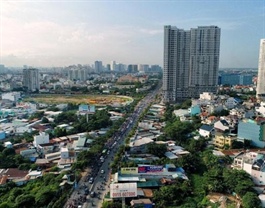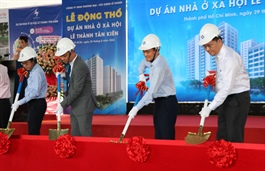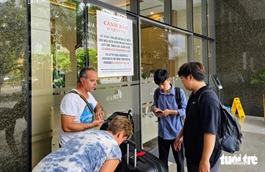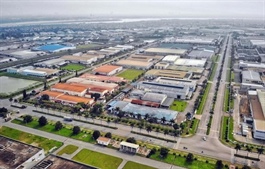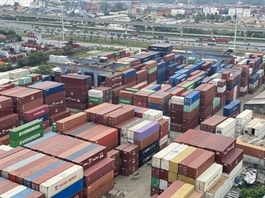Best results will come from eco-IP direction
Best results will come from eco-IP direction
Although the initial investment cost is higher than the cost of building traditional industrial parks, developers are still encouraged to follow the strategy of building green industrial areas for long-term gains.

According to Tran Thien Long, standing vice president of the Vietnam Industrial Real Estate Association (VARS), operating costs and rents in green industrial parks (eco-IPs) will be higher than normal IPs. However, it is necessary to consider the higher benefits for all sides, from developers and investors to tenants in the ecosystem.
“If an enterprise invests and commits to green transformation, it will certainly entice potential and valuable investors who will come to their IPs,” Long told VIR.
The most concerning current issue for IP development enterprises, according to Long, is not the issue of higher costs compared to previous investments, but how to make IP investors and enterprises renting warehouses and factories commit to effectively implementing a green transformation.
“IPs developers need to have specific commitments with sub-investors and tenants to jointly implement this transformation, then the value of the entire ecosystem will increase greatly. The image of IPs and manufacturers will also be much better according to investors and partners, so all parties will benefit,” he said.
Do Ngoc Diep, Vietnam green and resilient building programme lead for the International Finance Corporation (IFC), said that businesses and IPs with green transformation are having to pay high initial costs, but after only 2-3 years, they can recover the initial investment.
“If investors are having difficulty raising capital domestically, they can absolutely look to foreign green capital,” she said.
However, Tran Anh Dong, director of CAS-Energy, told VIR that it is currently very difficult for businesses to access green finance to transform. Furthermore, they also lack human resources to do so.
“We talk about green finance a lot, but activities have not done much, it’s almost Vietnamese businesses can’t access green finance both domestically and internationally,” Dong said.
For businesses which hope to be able to access financial resources from foreign funds, everything must be transparent, having clear business plans, high profits, and must have a reasonable and effective green transformation roadmap.
“The solution here is that although being supported by the government, the private sectors themselves must be more dynamic to be able to access this source of capital, there is a lot of green financial capital in the international market,” Dong added.
“This is also a double challenge for businesses when they have to fully implement stable production and business activities, implementing a greener transformation, and looking for capital to transform. This task is not easy when we have to do it all at the same time,” Dong said.
In addition, according to Long from the VARS, implementing the legal system related to eco-transformation in IPs will involve many ministries and branches, so there needs to be a “sector commander” to provide comprehensive direction for all sectors resolve bottlenecks promptly and reasonably, and support businesses on their transformation roadmap.
“This ‘sector commander’ will help Vietnam implement such a transformation systematically, avoiding overlaps that cause additional difficulties for businesses. The law is a solid legal basis for businesses to implement and support investors in the best way,” he said.
Research data from the VARS shows that, as of May 2024, the country has 425 IPs (including 4 export processing zones) established in 61 provinces, in a total natural land area of about 130,000 hectares.
IPs and economic zones have attracted over 10,400 domestic projects and over 11,200 valid foreign-led projects, with total registered investment capital of approximately $100 billion and $231 billion, respectively.
According to the Ministry of Planning and Investment, by 2030 the country will have about 575 IPs with a total natural land area of about 211,000ha.
One of the most vulnerable countries to climate change, the Vietnamese economy is already being impacted by an estimated loss equal to about 3.2 per cent of GDP in 2020, which is expected to escalate rapidly. While millions of Vietnamese rely on the ocean for a livelihood, the country’s blue economy is projected to contribute about 10 per cent to the GDP by 2030.
To achieve net-zero by 2050, Vietnam needs additional investments of about 6.8 per cent of GDP per year, or a cumulative $368 billion through 2040, half of which is expected to come from the private sector.




